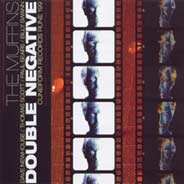The Muffins
Double
Negative
(Cuneiform)
It's
quite easy to call The Muffins the nearest thing to a group from the "Canterbury
School" that one could find in the States. The group came out right at
an end of an era - the end of the 70s - and so the quartet was immediately
labelled as a "curious anomaly" - i.e., a line-up from Washington
D.C. that considered Soft Machine, Caravan and Hatfield And the North (and
the European Rock In Opposition) as their sources of inspiration instead of
emulating the pompous prog rock groups that lived (and prospered) on both
sides of the Atlantic. It was easy to like their first album, Manna/Mirage,
and also its follow-up, 185, an album that saw the participation of former
Henry Cow and Art Bears Fred Frith - let's remember that Frith invited the
Muffins to participate to the sessions for his widely acclaimed (and perennially
in-print) album Gravity. Then the group split, with only some collections
of unreleased tracks (check Open City) as consolation for their fans.
Two
years ago, quite unexpectedly, they returned with a new album, Bandwidth.
It's obvious that in cases like this one's strong fear is to be confronted
with a tired-sounding, lukewarm CD, but this was not the case. We had again
a strong rhythm section (Billy Swann on bass and Paul Sears on drums), Thomas
Scott on wind instruments and Dave Newhouse on keyboards, baritone sax, bass
clarinet and composition. Doug Elliot's trombone was a nice addition. A strong
musical rapport, absolutely no bad aftertaste. Sure, it was not the album
that one would have suggested as the best example of "musical innovation,
2002", but Bandwidth was definitely worth a listen even for those who
are not big fans of the "genre" (by the way: is it only my impression
or albums by "prog" groups are required to pass more severe tests
than albums featuring other musical styles?).
After
the joy for their return, questions remained to be answered, both career-
and music-wise. Double Negative seems to leave a lot questions unanswered,
while posing even more problems. There's more jazz than before - there's also
the great Marshall Allen as guest artist on a couple of tracks - and this
is definitely not a bad thing. Some themes (Exquisite Corpse, They Come On
Unknown Nights, Cat's Game, Angel From Lebanon) are to be recommended. Again,
Doug Elliott's trombone is a nice addition. But there are problems. The string
quartet that's featured on a few tracks makes it possible for the group to
widen their stylistic palette, but sometimes the actual results are not so
great. Some climates, which would be perfectly appropriate for a movie soundtrack,
sound a bit out of place. Above all, a very clear but very cold-sounding digital
recording acts against the warmth and the "credibility" of the music
(what happened to the drums?). And yes, I know that nowadays one cannot use
the wha-wha organ from Angel From Lebanon for a whole album anymore, but was
there really no alternative to those annoying, anonymous timbres?
In
closing, I wonder whether I will be accused of asking that albums by "prog"
groups pass more severe tests than albums featuring other musical styles.
Beppe
Colli
©
Beppe Colli 2004
CloudsandClocks.net
| Dec. 12, 2004











